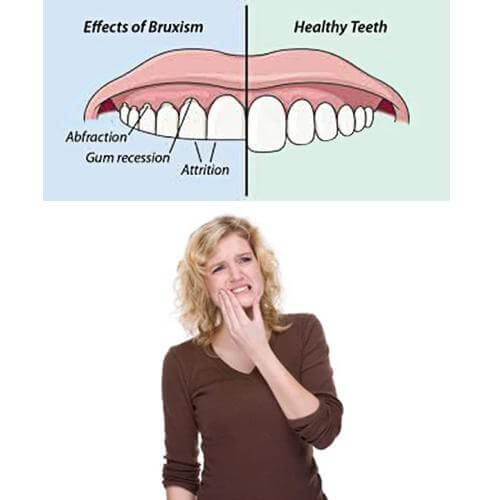
What are the signs and symptoms of teeth grinding?
Shopper Approved, llc Collaborator
August 12th, 2020
3 minute read
Audio generated by DropInBlog's Blog Voice AI™ may have slight pronunciation nuances. Learn more
Signs and symptoms of teeth grinding
Excessive clenching, scraping, or gnashing of teeth may chip away the enamel of the tooth and can cause the following physical signs and symptoms:
1. Grinding sound in your sleep
2. Toothache which appears to be particularly severe in the morning after you wake up
3. Pain and stiffness in the facial muscles and around the temples soon after you wake up
4. General sensitivity of the tooth, particularly to extreme temperatures
5. Headaches
6. Soreness and pain in the jaw when you wake up in the morning or when you chew
7. Ear pain Stiffness in the neck, which can occur occasionally
8. Many other signs involve sudden or repetitive breaking or fracturing in the patient's mouth of existing restorative work which includes crowns, veneers and fillings.
People with bruxism typically do have the following mental issues to deal with:
Career anxiety
Pain
Stress
Depression
Eating disorders
Bruxism can also take place without any visible symptoms. In these asymptomatic cases the patients remain unaware of their condition until they are heard by a family member grinding their teeth in their sleep.(8)
Diagnosing Bruxism:
When you experience facial pain radiating from your teeth and spreading up to your neck, followed for any obvious reason by headaches and soreness in the jaw, bruxism may be a potential cause.
The doctor will conduct a simple physical examination of the oral cavity to test for chipped or broken teeth, teeth indentations on the tongue, or bite marks on the inside of the lip, to make a definitive diagnosis.(9)
X ray:
The doctor may also order x-rays to better determine the severity of the issue. The degree of the dental and skeletal damage caused by repetitive trauma can be identified by dental X rays.(10)
Summary:
Although a general dentist can be a first approach for bruxism diagnosis, there are consultants such as dentists in oral medicine, oral surgeons, or orthodontists that may make specific diagnoses and offer advanced care.
Surgical intervention is needed in rare cases where the bruxism has caused damage to the temporomandibular joint.
References:
1. Reding GR, Zepelin H, Robinson JE Jr, Zimmerman SO, Smith VH. Nocturnal teeth-grinding: all night psychophysiological studies. J Dent Res 1968;47: 786–97.
2. Faulkner K. Bruxism: a review of the literature. Part I. Aust Dent J 1990;35:266–76.
3. Faulkner K. Bruxism: a review of the literature. Part II. Aust Dent J 1990; 35: 355–61.
4. Lavigne GJ, Montplaisir J. Bruxism: epidemiology, diagnosis, pathophysiology, and pharmacology. In: Fricton JR, Dubner RB, editors. Orofacial pain and temporomandibular disorders. New York: Raven Press; 1995. p. 387–404.
5. Molin C. From bite to mind: TMD – a personal and literaturereview. Int J Prosthod 1999;12:279–88.
6. Lobbezoo F, Naeije M. Bruxism is mainly regulated centrally, not peripherally. J Oral Rehab 2001; 28:1085–91.
7. Madrid G, Madrid S, Vranesh JG, Hicks RA. Cigarette smoking and bruxism. Percept Mot Skills 1998;87:898.
8. Hublin C, Kaprio J, Partinen M, Koskenvuo M. Sleep bruxism based on self-report in a nationwide twin cohort. J Sleep Res 1998;7:61–7.
9. McEwen B. Protective and damaging effects of stress
mediators. New Engl J Med 1998;338:171–9.
10. Von Onciul J. Stress at work. BMJ 1996;313:745–8.
« Back to Blog